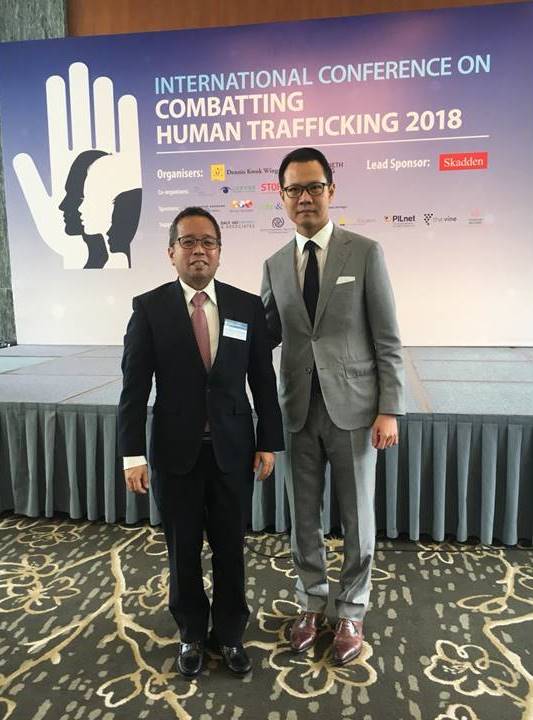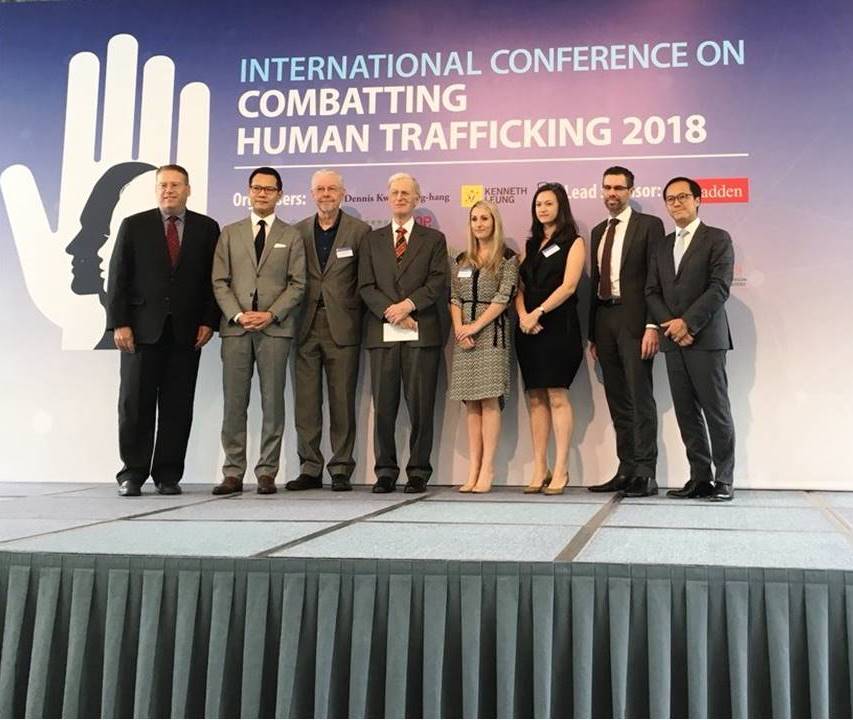Hong Kong legislators organized a half-day international conference at the Asia Society Hong Kong Center on 27 April 2018 to discuss issues, promote awareness and encourage initiatives in crafting measures to combat human trafficking.
The International Conference on Combatting Human Trafficking sought to gather international experts, members of the consular corps, chambers of commerce, international businesses, prominent law firms and civil society groups. Consul General Antonio Morales and Consul Paulo Saret represented the Philippine Consulate General.
The conference was organized by Hong Kong Legislative Council (Legco) members Dennis W.H. Kwok and Kenneth Leung, who are proponents of the Modern Slavery Bill of 2017 pending before the Legco.
“The United Nations called human trafficking and modern slavery the most serious human rights abuse of our times,” Mr Kwok said in opening remarks, adding that the industry makes US$150 billion in profits and counts 14 million individuals as victims. There is a need for Hong Kong to address the issue as it may be used a as human trafficking area of operations.
Mr Kwok said they are holding the international conference because “we don’t only just care about what happens within the geographical confines of Hong Kong. Because this is a global issue and we care about what we can do as a global partner, as a responsible member of the international community.”
In a keynote speech, Hong Kong Chief Secretary for Administration Matthew Cheung Kin-chung stressed: “Trafficking in persons is a heinous crime that has never been tolerated in Hong Kong.” He agreed on the need to undertake concerted efforts and keep those efforts “under continuous review and updating from time to time to keep abreast of changes.”
Cheung said Hong Kong Government launched last month a high-level internal Steering Committee comprising all the relevant policy secretaries and department heads, which he personally chairs, in order “to map out and take forward an overarching strategy and heighten public awareness of trafficking in persons.”
Immediately after its launch, the Committee unveiled an Action Plan to Tackle Trafficking in Persons and Enhance Protection of Foreign Domestic Helpers, which comprises several key building blocks covering victim identification, protection and support, investigation, enforcement, prosecution and prevention as well as partnership with stakeholders.
“Whilst we do not have the form or semblance of a single piece of law to tackle human trafficking, we do have the full substance and range of effective penalties and criminal sanctions for this purpose through a host of legislation,” Cheung concluded.
Another keynote speaker, Lord McColl of Dulwich, who led efforts in the House of Lords to expand the Modern Slavery Act of the United Kingdom, underscored the importance of having comprehensive and specific legislation to combat human trafficking based on his own experience and vision in combating the scourge of forced labor and modern slavery.
“In the UK, after developing a number of different offenses over several years we concluded that what was needed was one Single Act of Parliament to bring those offences, and other provisions on trafficking and slavery, together into one law,” the Conservative peer said.
Two panel discussions ensued, with the first involving as panelists Lord McColl, Mr Kwok, U.S. Consul General Mr Kurt Tong, and Ms Sara Goldsworthy, Assistant Secretary for Peoples Smuggling and Human Trafficking Taskforce of Australia’s Department of Foreign affairs and Trade, to discuss efforts to combat human trafficking on an international level.
The second discussion asked panelists Tony Read, founder of NGO Stop Trafficking of People, Hong Kong-based human rights lawyer Patricia Ho, and Mr. Jeremy Birch, a lawyer whose legal practice includes issues relating to anti-money laundering and the prevention of financial crimes, whether Hong Kong needs a human trafficking law.
During the open forum, Consul General Morales informed the body that the Philippines belongs to Tier 1 (the highest rating) of the U.S. Department’s Trafficking in Persons Report not only because of its accession to the Palermo Protocol, but also through its domestic laws and rules on anti-human trafficking.
He mentioned that the pro-active stance of the government on anti-human trafficking resonates even to its Foreign Service Posts, which prompted the Consulate General in Hong Kong to host, together with the International Organization for Migration, an Anti-Human Trafficking Seminar for Consular Officers on 12-13 April of this year.
He also underscored the necessity of fostering cooperation among the other consulates general in Hong Kong for the sharing of best practices and information regarding anti-human trafficking.



